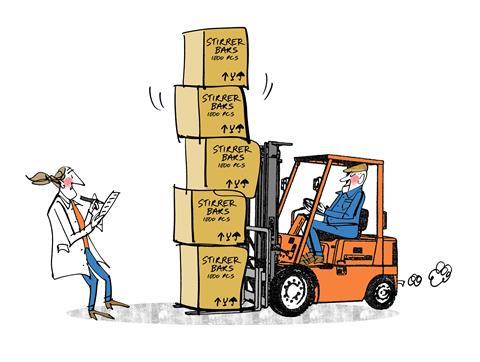Liaising with suppliers is more than just following orders
We stood in our lab storage space, silently evaluating five hefty cardboard boxes stacked in front of us. One had been hacked open. Stirrer bars spilled out onto the floor. The remaining boxes – as yet unopened – would also contain several gallons of rattling stirrer bars. My PhD supervisor folded his arms. I looked slightly sheepish.
‘I’m sorry. I honestly thought I was ordering five packets of stirrer bars.’
“Well,’ my boss conceded, ‘at least we’ll have some extras.’
I’m going to be honest. When I agreed to take on the position of purchasing coordinator in my PhD lab it wasn’t because I wanted to be helpful and contribute to the collective success of my research group; it was all about the power. Purchasing responsibility meant lab mates would come up to my office desk throughout the day, clutching scraps of paper that signified a new project, or the exciting move from reaction optimisation to expanding the substrate scope. The paper scraps could also signify bad tidings: the aftershock of despair that came as they’d set up a vital reaction and realised the last reagent they needed to add was down to its final flakes in the bottle. Most lab members learned quickly that minimising my general annoyance was now linked to their own research program success.

While snapping out repeat orders barely raised pulse, managing a one-off large equipment purchase required creative areas of the brain rarely accessed in the daily grind of benchwork. A new lab fridge or reactor is expensive, so my PhD supervisor would demand I get a discount from the vendor. What always followed was a brazen, convoluted and totally unbelievable game of good cop–bad cop. ‘I’d love to go ahead with our order … but I’m afraid my boss has to approve all purchases over £4000 … and, um, he’s just left on a three-week international business trip with no access to email. So … any chance of an additional discount?’ No vendor ever took such charades at face value – they probably walk through this exchange four times a week – but they’d still politely offer a bonus 2.32% discount that my supervisor could claim as a moral victory.
How involved supervisors are with purchasing is a matter of variance. Some will swat away a newbie’s nervous petitions (‘If a chemical costs less than £200 I don’t need to know about it.’) Others perform linear regression analysis on quantities of bulk solvents bought and ‘express concern’ when acetone consumption creeps 1.4 times higher than the previous month. Regardless of their grip on the purse strings, most academics lag 5–10 years behind current inflation rates, and express surprise when 10g of air-sensitive metal catalyst comes out at more than £15.
As purchasing coordinator, the quantities of money I burned through was staggering. Our organic synthesis lab usually housed 8–10 productive workers. I’d sit down at my desk with a mug of reheated coffee to reorder mundane lab supplies, and whoosh! I’d just spent £800 of my PI’s cherished grant money. I knew by the end of the week I’d have to alleviate him of £500 more for some nitrile gloves and a tub of sodium chloride. Before I took on purchasing I couldn’t comprehend the amount of cash it took to sustain a medium-sized lab. I still can’t.
No one could get drunk off the power of being purchasing coordinator. Postgraduates from the ground floor would sneak into my office: ‘We’ve been having issues in our lab: chemicals from Sigma are arriving a few days later than usual. Have you been having that problem, or is it something to do with our purchasing coordinator, James?’ I’d assure them that James wasn’t the issue here, and could they just calm down and wait for their chemicals?
I endured hours of hold music, chasing down rogue chemicals from flaky suppliers. I sweated over new purchasing software and the correct 20-digit grant number to go with each order. And yes, I made mistakes with orders – rarely drastic, always embarrassing. The role of purchasing coordinator is often challenging, but it’s never boring. And, if the worst does happen, at least you have a lifetime’s supply of stirrer bars…












No comments yet